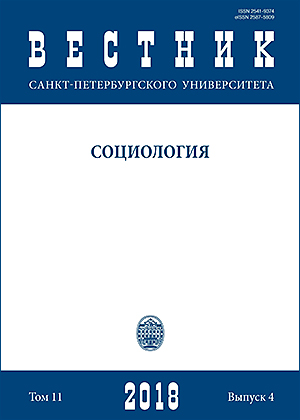Perception of the “Smart City” concept by active citizens in St. Petersburg
DOI:
https://doi.org/10.21638/spbu12.2018.402Abstract
The concept of smart city development is becoming more relevant all over the world. There are already few examples of smart cities’ effective construction both in the agglomerations already existing and started completely from scratch. In this concept, citizens are presented as the key stakeholders. In Saint Petersburg, smart city projects implementation has started in 2017. The paper presents the results of a pilot empirical study of “smart city’s” perceptions by active citizens conducted in November 2017. The purpose of the research was to study the perception of the “smart city” concept by active citizens. To achieve this goal, the use of information technologies, ways of responding to city problems and expectations from the project “Smart St. Petersburg” were studied. The survey was conducted using the online survey method, 421 respondents participated in the survey. The obtained data demonstrated a high level of information technologies presence in everyday practices of city residents, and preference for using electronic channels when interacting with the authorities (94 %). Citizens estimate the effectiveness of appeals through electronic portals at 57 %. Awareness of the “Smart city” project is high and reaches 74,6 % among the respondents. According to citizens’ opinions, smart city development should begin with the inclusion of citizens in the management processes, as well as with solving urban problems. In addition, the introduction of smart city services should primarily focus on overcoming the urban problems: public transport, traffic jams, parking, construction. In general, the research estimated the prevalence of positive attitudes to the future of “Smart St. Petersburg” (77 %) among the surveyed citizens.
Keywords:
smart city, social adaptation, survey, information technology, active citizens
Downloads
References
References
Downloads
Published
How to Cite
Issue
Section
License
Articles of "Vestnik of Saint Petersburg University. Sociology" are open access distributed under the terms of the License Agreement with Saint Petersburg State University, which permits to the authors unrestricted distribution and self-archiving free of charge.




